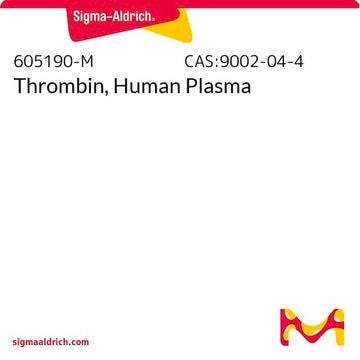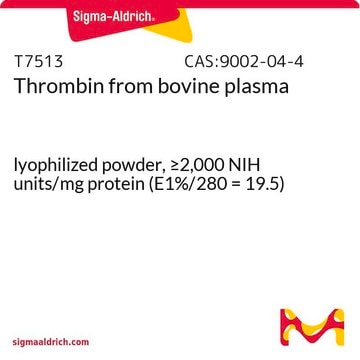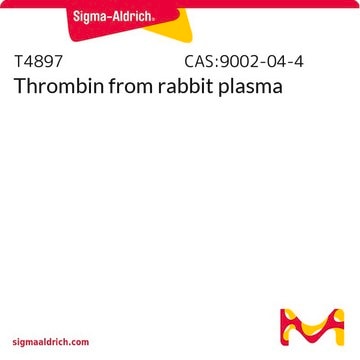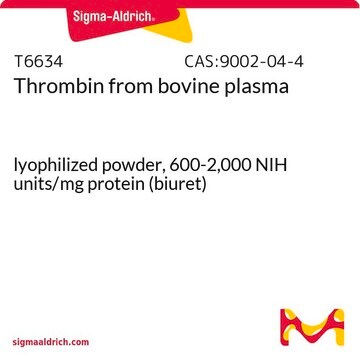10602400001
Roche
Thrombin
from human plasma
Synonym(s):
coagulation factor Iia, thrombin
Sign Into View Organizational & Contract Pricing
All Photos(1)
About This Item
Recommended Products
biological source
human plasma
Quality Level
form
lyophilized
specific activity
~120 units/mg protein (At 25 °C with Chromozym TH as the substrate.)
mol wt
Mr ~33.6 kDa
packaging
pkg of 20 U
manufacturer/tradename
Roche
optimum pH
8.2-9.0
shipped in
wet ice
General description
Thrombin is a Na+ activated allosteric serine protease. It belongs to chymotrypsin family. Thrombin is made of two polypeptide chains of 36 (A chain) and 259 (B chain) residues that are covalently attached with a disulfide bond.
Thrombin is a coagulation factor IIa. It is a serine endopeptidase that hydrolyzes peptide and ester bonds specifically at the carboxylic side of Arg. The enzyme converts fibrinogen to fibrin. The product contains EDTA and additional stabilizing agents.
Application
Thrombin has been used in the expression and purification of recombinant RELM (resistin-like moleculefamily members. It has also been used in platelet spreading on fibrinogen and immunostaining.
Thrombin is used in coagulation research, medical research, protein-structure analysis, and biochemical research. It has been used for the stimulation of the platelets.
Biochem/physiol Actions
Thrombin plays an important role in blood coagulation. It serve as a procoagulant factor while transforming fibrinogen into an insoluble fibrin clot. Thrombin can act as anticoagulant by the activation of protein C.
Physical form
Lyophilizate
Preparation Note
Storage conditions (working solution): -15 to -25°C
Inhibitors: DFP, TLCK, PMSF, benzamidine, α1-antitrypsin, α2-macroglobulin, antithrombin III heparin, hirudin, and APMSF
Inhibitors: DFP, TLCK, PMSF, benzamidine, α1-antitrypsin, α2-macroglobulin, antithrombin III heparin, hirudin, and APMSF
Reconstitution
The reconstituted solution contains 20 mM EDTA.
Important note:
Use plastic vials and pipettes because thrombin will be adsorbed to glass surfaces!
Important note:
Use plastic vials and pipettes because thrombin will be adsorbed to glass surfaces!
Storage and Stability
Store at 2 to 8 °C. (Store dry!)
Other Notes
For life science research only. Not for use in diagnostic procedures.
Disclaimer
RESEARCH USE ONLY. This product is regulated in France when intended to be used for scientific purposes, including for import and export activities (Article L 1211-1 paragraph 2 of the Public Health Code). The purchaser (i.e. enduser) is required to obtain an import authorization from the France Ministry of Research referred in the Article L1245-5-1 II. of Public Health Code. By ordering this product, you are confirming that you have obtained the proper import authorization.
Signal Word
Warning
Hazard Statements
Precautionary Statements
Hazard Classifications
Acute Tox. 4 Inhalation - STOT RE 2
Storage Class Code
11 - Combustible Solids
WGK
WGK 2
Flash Point(F)
does not flash
Flash Point(C)
does not flash
Certificates of Analysis (COA)
Search for Certificates of Analysis (COA) by entering the products Lot/Batch Number. Lot and Batch Numbers can be found on a product’s label following the words ‘Lot’ or ‘Batch’.
Already Own This Product?
Find documentation for the products that you have recently purchased in the Document Library.
Customers Also Viewed
Thrombin: Physiology and Disease (2010)
Hsiao-Chuan Liu et al.
Journal of biophotonics, 14(3), e202000364-e202000364 (2020-12-15)
Embolectomy is one of the emergency procedures performed to remove emboli. Assessing the composition of human blood clots is an important diagnostic factor and could provide guidance for an appropriate treatment strategy for interventional physicians. Immunostaining has been used to
Partially defective store operated calcium entry and Hem (ITAM) signaling in platelets of serotonin transporter deficient Mice.
Wolf K, et al.
PLoS ONE, 11(1), e0147664-e0147664 (2016)
Gloria E Hernandez et al.
Nature cardiovascular research, 1(1), 67-84 (2022-05-24)
Leukocytes and endothelial cells frequently cooperate to resolve inflammatory events. In most cases, these interactions are transient in nature and triggered by immunological insults. Here, we report that in areas of disturbed blood flow, aortic endothelial cells permanently and intimately
INAUGURAL ARTICLE by a Recently Elected Academy Member: Resistin-like molecule β is a bactericidal protein that promotes spatial segregation of the microbiota and the colonic epithelium.
Propheter D C, et al.
Proceedings of the National Academy of Sciences of the USA, 114(42), 11027-11027 (2017)
Our team of scientists has experience in all areas of research including Life Science, Material Science, Chemical Synthesis, Chromatography, Analytical and many others.
Contact Technical Service










